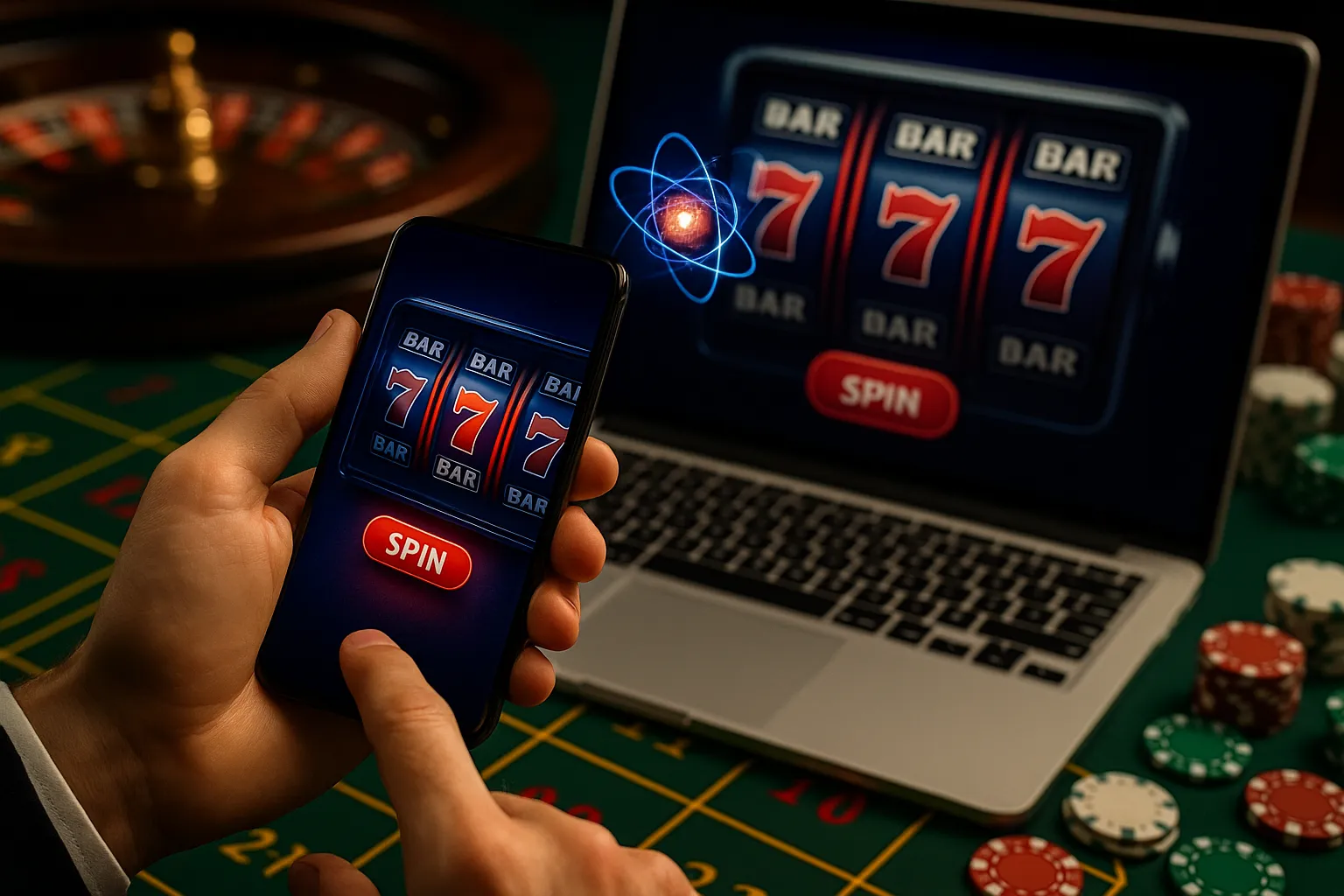Gambling technology has come a long way since the first mechanical slot machines clanged into casinos over a century ago. With continuous innovation in digital slot development, one question that’s bubbling up among industry insiders and tech enthusiasts alike is whether quantum mechanics will soon power the random number generators (RNGs) behind our favorite games. As someone who’s tested countless slot titles—from basic 3‑reel classics to the latest megaways—I’m fascinated by the promise of genuinely unpredictable outcomes. Could quantum‑driven RNGs mark the next frontier in fairness and security, or is it science fiction at this point? In this article, I’ll explore the current state of RNG, the potential of quantum sources, practical implications for players, and the timeline for real‑world adoption.
What Makes RNG “Random” Today?
Modern online slots rely on pseudorandom number generators (PRNGs), algorithmic constructs that simulate randomness by processing a seed number—often derived from system time or cryptographic hashes—through complex mathematical functions. While PRNGs produce sequences that pass statistical tests for randomness, they are inherently deterministic. Given the same seed and algorithm, a sophisticated attacker could theoretically predict outcomes.
Regulators and developers mitigate this by using robust, audited algorithms together with frequent re‑seeding. Independent testing labs like eCOGRA and iTech Labs run thousands of computational analyses to ensure that game outcomes match expected distributions. This setup has served the industry well for decades, but as computing power grows, questions arise about the ultimate unpredictability of pseudorandom systems.
Why Quantum RNG Could Change the Game
Quantum random number generators (QRNGs) harness physical processes—like photon arrival times, electron tunneling, or radioactive decay—to generate true randomness. Unlike PRNGs, which follow deterministic code paths, QRNGs tap into fundamental quantum uncertainty. In theory, this yields sequences that are provably non‑deterministic.
From conversations with cryptography researchers, I’ve learned that QRNG outputs can be easily integrated into existing slot engines. For instance, an online casino could request real‑time random bits from a cloud‑based quantum service, then feed them into its game server. Some pioneering non GamStop casinos have already partnered with quantum startups to test this functionality, aiming to advertise “true quantum randomness” as a unique selling point.
Potential Benefits and Challenges
True randomness isn’t just a marketing buzzword—it carries practical advantages. QRNG-based games could eliminate theoretical vulnerabilities in PRNG reseeding or seed compromise. In environments where provable fairness is paramount, this added layer of unpredictability could strengthen player trust.
However, integrating quantum sources introduces latency and infrastructure complexity. Quantum devices often reside in specialized labs, requiring secure, low-latency connections. While small random bit requests pose minimal lag, high‑volume gaming applications demand careful architectural planning to avoid impacting user experience. Additionally, quantum hardware and services come at a premium cost, which could slow widespread adoption until economies of scale kick in.
Real‑World Trials and Industry Movements
Several tech firms have launched QRNG-as-a-service platforms, and a handful of innovative gaming companies have started pilot projects. In 2024, a leading blockchain casino integrated quantum‑sourced randomness into a provably fair slot demo on a testnet, showcasing how on‑chain hash commitments could work alongside quantum inputs. Early feedback was positive, with tech-savvy players praising the transparency; however, mainstream adoption remains limited to niche or high‑roller markets.
Regulatory acceptance is another hurdle. Licensing bodies must adapt existing standards to account for quantum processes. To date, few jurisdictions have issued formal guidelines around QRNG in gaming. I anticipate that Malta and Curacao, known for accommodating emerging tech, will lead the way, followed by stricter regulators like the UKGC once foundational frameworks are in place.
What This Means for Players
From a player’s perspective, the shift to quantum RNG shouldn’t alter how you spin the reels. Odds, volatility, and RTP remain determined by game design. The real value lies in assurance: when you see a “quantum certified” badge, you know each spin draws on physics rather than code. For those wary of algorithmic vulnerabilities, this transparency can be reassuring.
If you’re exploring cutting-edge offerings, look for platforms advertising QRNG integrations. Some blockchain-based casinos already post quantum RNG audit trails on public ledgers, letting you verify seed generation in real time. For conventional operators, seek third-party certifications from labs accredited for quantum testing.
Timeline to Quantum‑Driven Slots
While academic research and pilot programs have accelerated in recent years, I estimate it will take at least three to five years for QRNG slots to reach mainstream audiences. Key milestones include:
• Establishment of robust, low-latency quantum randomness APIs.
• Development of regulatory standards and certification processes.
• Cost reductions in quantum hardware and service subscriptions.
• Widespread integration into major game engines and casino platforms.
By 2028, I expect several well-known operators—potentially including both land‑based brands and major online sites outside self-exclusion frameworks—to roll out limited-availability quantum RNG slots. Early adopters will market these titles as the pinnacle of fairness, attracting players who value transparency and technological innovation.
Strategic Considerations for Casino Operators
Casinos looking to stay ahead should begin familiarizing themselves with quantum providers now. Partnering with startups offering QRNG-as-a-service can inform infrastructure planning and player communication strategies. Integrating quantum inputs into a demo environment lets operators gauge performance impacts and refine user interfaces before full-scale deployment.
Communication is key: explain to players why quantum randomness matters and how it differs from traditional RNG. Educational content—videos, infographics, and blog posts—will help demystify the concept and encourage uptake. Ultimately, the casinos that blend cutting-edge tech with clear, player-centric messaging will stand out in a crowded market.
Looking Beyond Slots
While slots are the most visible application, quantum randomness has broader gaming implications. Live dealer shuffles, digital card games, and prize wheels could all benefit from true randomness. Even sports betting platforms might use QRNG to seed statistical simulations or random draw events for promotions. The foundational principle is the same: enhance trust through physics-based unpredictability.
Real‑World Example: Blockchain Meets Quantum
In a recent online conference, one blockchain gaming platform demonstrated how quantum randomness could feed into smart contracts. Each spin on their test slot triggered a quantum bit request, hashed and recorded on a public ledger. Players could audit the transaction history to confirm that no party—not even the casino operator—predetermined outcomes. Though still proof of concept, this fusion of blockchain transparency and quantum security hints at a future where trust doesn’t hinge on central authorities.
Potential Drawbacks and Ethical Considerations
No technology is without caveats. Dependence on quantum hardware could introduce supply chain vulnerabilities or single points of failure. Operators must ensure redundancy—multiple quantum sources or fallback PRNG modes—to maintain uptime. Cost is another factor; startups may charge premium fees, passing expenses onto players or absorbing them as operational overhead.
Ethically, promoting quantum RNG as “100% fair” without contextualizing statistical mechanics can mislead less informed players. It’s important to clarify that quantum randomness addresses unpredictability but doesn’t alter inherent house edges. Clear, accurate marketing messaging ensures players understand both the benefits and limitations of this emerging tech.
Conclusion: Are We Ready for Quantum Slots?
The notion of quantum‑driven RNG in slots moves gaming from code to physics, promising an unprecedented standard of unpredictability. While practical hurdles—latency, cost, regulation—remain, the groundwork is being laid by research labs, quantum providers, and forward-thinking operators. As players, we can look forward to a future where every spin’s outcome traces back to fundamental physical phenomena, not just algorithms.
In the meantime, stay curious. Follow industry news, explore provably fair blockchain demos, and consider testing early quantum RNG pilots. By the time widespread adoption arrives, you’ll be well-versed in the technology that could redefine gaming fairness.








